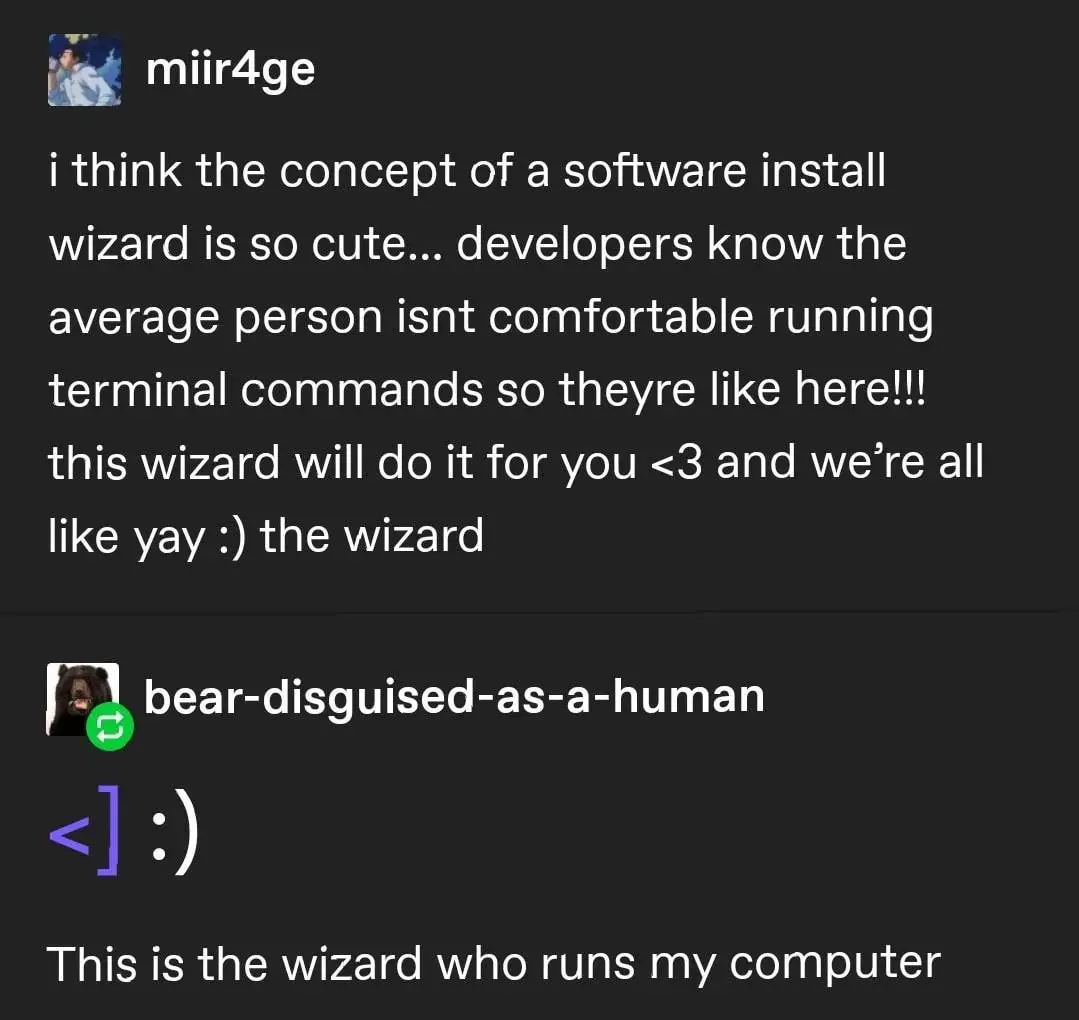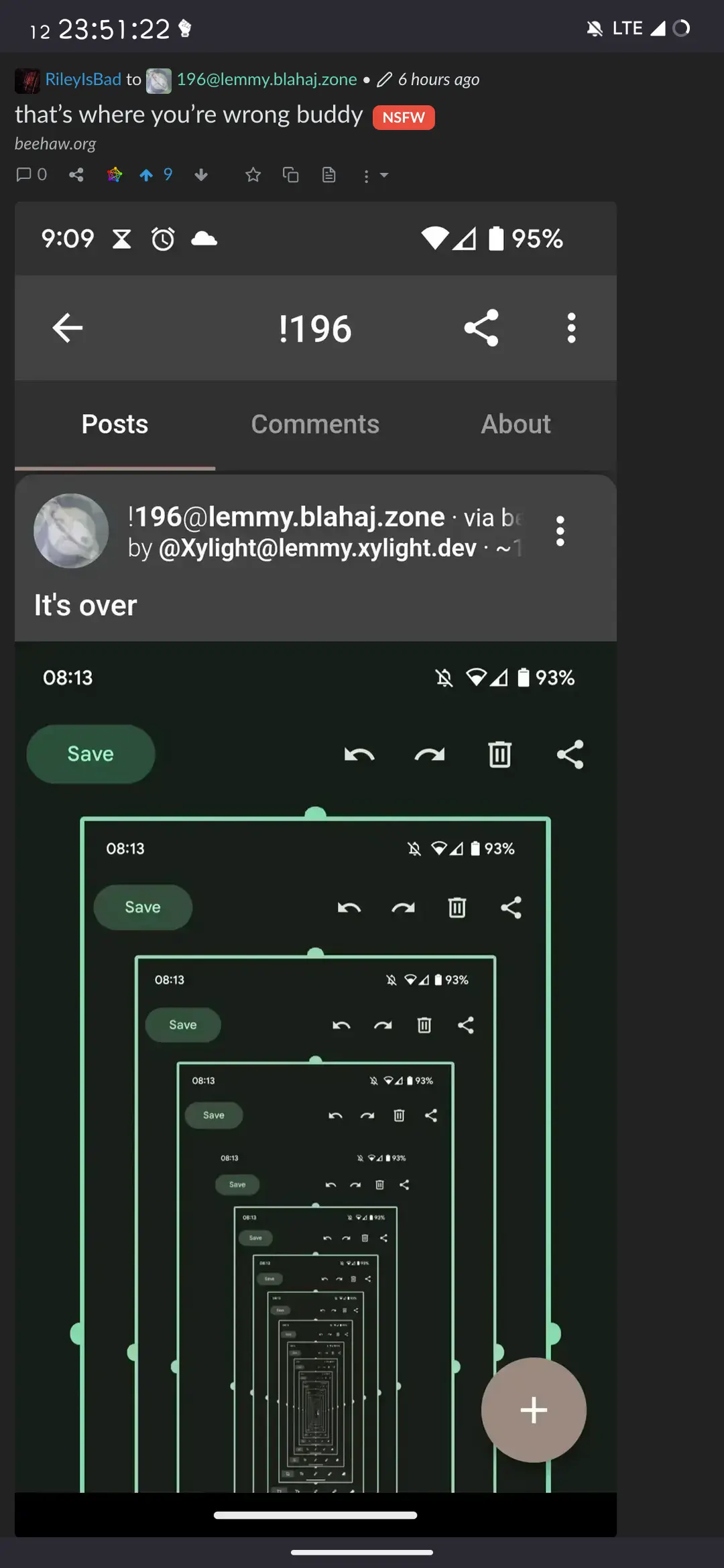Actually my gender got corrupted sometime in the past, I don't really have it anymore. And I still don't have sex, btw.
Imagine you come home and see this... But you're actually not in a relationship. sussy baka astronauts live in your walls....
Jesus is so hot, I don't understand how in the world some Reddit atheists hate him 😏😋




Note: originally written in Italian, translated into English via DeepL and some manual corrections.
Some people in my country will know this: the new anti-piracy bill** has been approved in Italy, and now the doubts we free-sharing enthusiasts have to deal with are many:
- When will it actually become law? (I hope not exactly at the time of me writing this post 😰)
- How much money must the entertainment lobbies have spent to ensure that the law was passed with complete unanimity?
- What real consequences will it bring to us common citizens?
The point that perhaps struck me most about the law (here the PDF examined by the Commission, and the final report) - perhaps because I own several totally personal online properties, which have zero economic value to me, but unquantifiable sentimental value - is the obligation for ISPs to respond to instant blocking requests.
A copyright holder can send a blocking request that, when urgent - think of a live sports match, which is being illegally rebroadcast in real time - must be honoured in no more than 30 minutes by all providers, without any adversarial or formal process: it will be the owner of the blocked website who will then have to have legal proceedings opened to contest the blocking and demand restoration.
For unlawful sites, all domain and sub-domain names (DNS), and IP addresses, present and, I have no idea on the basis of what limits, all possible future ones, will be blocked.
By 'providers' is meant not only telephony operators, who provide the connection to the Internet, but in general those 'involved in any capacity in the accessibility' of illegal services, and explicit reference is even made to search engines.
Search engines do nothing more than return links accompanied by a description, and in fact do not directly provide pirated material: in practice, this law even wants to punish those who only provide links, not just those who allow downloads.
By this logic, the operators of social networks, (and I imagine that 'information society' in the text refers precisely to them), and possibly small online communities, will also be held responsible.
The potential for abuse and mistakes is very high, and indeed, viewed impartially, this move can in any case be summarised as the obligation for ISPs to build a mega-firewall, for all intents and purposes under the ultimate control of the state, with all the problems that come with that (even accidental ones).
Sooner or later there will be an incident of over-blocking, and problems will occur on Web services that have nothing to do with piracy, if they mess around with IPv4 address blocks.
In any case, a big rise in price will probably be seen on everyone's Internet bill, even those who do not consume or share pirated material!
Centralising a network that has existed for dozens of years, built from the beginning as decentralised, is not easy, and other states that strive to control information know this well.
An example can be made by comparing Russia and China: both states have a certain desire to control political dissent on the Internet, but:
- For Russia it's difficult, as it has a more traditional Internet infrastructure, which began to develop as decentralised long before Putin's arrival, when the present government was of a different type.
- For China it's easier, because the government in office at the time (the Communist Party, as it is today), understood the potential of the Internet, and made sure that it was developed in a centralised manner from the outset.
It is then inevitable that raising now, from nothing, this mega-wall of fire, will entail substantial costs, which will however be at the total expense of all of us consumers, instead of being at the expense of the billionaire entertainment multinational companies (who will only pay for the unified state platform that will connect rights holders and ISPs).
But this last detail, quite rightly, does not matter to our parliamentarians and senators, who, luckily for them, for many and many years have been receiving €1,200 and €1,650 per year respectively for their telephone expenses, thanks to those of us, dumbass citizens, who pay taxes.
Besides wanting to specifically and unequivocally counteract the 'live broadcasting' of duplicate content - something that is already causing bad vibes among those football fans with a limited budget - apart from the usual content in general (audiovisual, print, or software), the law goes expressly against end users, at least a certain category.
In fact, fines of up to €5,000 in the event of a repeat offence will be done for those who (as far as I can tell from reading the bill and watching other people's videos and articles) buy subscriptions to pirate paid services, such as the infamous 'pezzotti', the illegal IPTV packages.
All in all, despite the initial general fear and alarmism, it seems that the only users who have anything to fear are precisely the latter, because - although it has to be said that I know relatively little about the law, and it is not easy to apply generic text comprehension skills to legal texts, so who knows - the text talks about buying or renting, and not things like downloading at no cost.
If, therefore, surfing the Internet to find links to 'crunchy' football matches, with pixels as big as biscuits and a buffering habit, or downloading the tenth film of the week via torrent, or hoarding freely repackaged video games, one can well imagine that things will remain as they are in this respect.
On the other hand, those who participate in the sharing of copied content, even with a torrent left in seeding, could live decidedly less peaceful moments. In Italy it seems like no individual seeder has ever been prosecuted, nor has their connection ever been blocked, but with the authorisation to block IP addresses the situation risks change, and maybe from now on ISPs will have to stop trashing lawyers' letters; if not the hundreds that arrive every day from the United States, with the audacity of wanting European citizens to respect a law only present in the United States (the DMCA), at least the few annual ones from Italy.
Those who fare worse in this whole affair are certainly the members of the 'digital mafia' - as Massimiliano Capitanio, commissioner of AGCOM, calls it - i.e. those who sell pirated premium packages, making a profit: for them, fines of up to €15.5K and imprisonment for up to 3 years.
Perhaps, if this new law only targeted them, there would not be much to discuss: they have no passion for sharing, only for money.
Perhaps there would not be much of an objection even if, in going against the platforms that make certain links available, one were to consider taking action only against those for-profit companies: Google, Microsoft (with Bing), Facebook, Twitter, and the like.
But in Italy we have already had the destruction of TNTVillage, and I don't want the decimation also of all the other online town squares created by people for people - without profit, and indeed often at a loss, both in time and money - just because someone is bothered by the fact that the main feature of the Web is being used: hypertext links, invented to favour the free and unrestricted sharing of culture and entertainment.
Let's hope I can keep seeding without a VPN, the State must not put its nose in my Raspberry Pi.
Alcuni lo sapranno, in Italia è stata approvata la nuova legge anti-pirateria, ed ora i dubbi con cui noi appassionati della condivisione libera dobbiamo confrontarci sono diversi:
- Quando entrerà in vigore? (Spero non esattamente nel momento in cui sto scrivendo questo post 😰)
- Quanti soldi avranno speso le lobby dell'intrattenimento per assicurarsi che la legge venisse approvata alla totale unanimità?
- Quali conseguenze reali porterà a noi comuni cittadini?
Il punto che forse più mi ha colpita della legge (qui il PDF esaminato dalla Commissione, e la relazione finale) - forse perché possiedo svariate proprietà online, totalmente personali, che hanno per me zero valore economico, ma inquantificabile valore sentimentale - è l'obbligo per i fornitori di servizi Internet di rispondere a richieste di blocco istantanee.
Un detentore di diritti d'autore può inviare una richiesta di oscuramento che, quando è d'urgenza - si pensi ad un incontro sportivo in diretta, che in tempo reale sta venendo ritrasmesso illegalmente - deve essere onorata in non oltre 30 minuti da tutti i provider, senza alcun contraddittorio o formale processo: sarà il proprietario del sito web bloccato a dover far poi aprire un procedimento legale per contestare il blocco e richiedere il ripristino. Per i siti illeciti è previsto il blocco di tutti i nomi di dominio e sottodominio (DNS), e degli indirizzi IP, presenti e, non ho idea in base a quali limiti, tutti i possibili futuri.
Per "fornitori" non si intendono soltanto i gestori di telefonia, che forniscono il collegamento ad Internet, ma in generale quelli "coinvolti a qualsiasi titolo nell'accessibilità" dei servizi illegali, e si fa addirittura esplicito riferimento ai motori di ricerca. I motori di ricerca altro non fanno che restituire link accompagnati da descrizione, e nell'effettivo non forniscono direttamente materiale pirata: in pratica, questa legge vuole persino ostacolare chi fornisce solo dei link, non solo chi permette lo scaricamento dei dati. Per questa logica, saranno criminalizzati anche i gestori di social network, (e immagino che nel testo con "società dell'informazione" si faccia riferimento proprio a loro), e possibilmente piccole comunità online.
Il potenziale per abusi ed errori è altissimo, e in effetti, vista in modo imparziale, questa mossa si può in ogni caso sintetizzare nell'obbligo per gli ISP di costruire un mega-firewall, a tutti gli effetti sotto il controllo ultimo dello Stato, con tutti gli altri problemi che ne derivano (persino accidentali). Prima o poi si verificherà un incidente di sovra-blocco, e si verificheranno problemi su servizi Web che non centrano nulla con la pirateria, se ci si mette a smanettare con i blocchi di indirizzi IPv4.
In ogni caso, una grossa botta si vedrà probabilmente sulla bolletta di tutti, anche di chi non consuma o condivide materiale pirata! Centralizzare una rete esistente da decine di anni, costruita fin dall'inizio come decentralizzata, non è facile, ed altri stati che si adoperano per controllare l'informazione lo sanno bene.
Un esempio si può fare mettendo a confronto Russia e Cina: entrambi gli stati hanno una certa voglia di controllare il dissenso politico su Internet, ma:
- Per la Russia è difficile, in quanto ha un'infrastruttura di Internet più tradizionale, che iniziò a svilupparsi come decentralizzata da ben prima dell'arrivo di Putin, quando il governo presente era di un altro tipo.
- Per la Cina è più facile, perché il governo in carica all'epoca (il Partito Comunista, come oggi), comprese le potenzialità di Internet, e fece si che lo sviluppo avvenisse da subito secondo uno schema centralizzato.
È allora inevitabile che innalzare ora, dal nulla, questo mega-muro-di-fuoco, comporterà costi sostanziali, che però saranno a totale scapito di tutti noi consumatori, invece di essere a spese delle multinazionali miliardarie dell'intrattenimento (su cui graveranno soltanto i costi della piattaforma di Stato unificata che collegherà detentori di diritti ed ISP).
Ma quest'ultimo dettaglio, giustamente, non importa ai nostri parlamentari e senatori, che per loro fortuna da tanti e tanti anni ricevono rispettivamente 1200 e 1650 € annui solo per le spese telefoniche, grazie a quelli che tra noi, cittadini coglioni, pagano le tasse.
Oltre a voler contrastare in maniera specifica e ormai inequivocabile la "diffusione in diretta" di contenuti duplicati - qualcosa che sta già generando malumori tra quegli appassionati di calcio con un budget risicato - a parte che in generale i soliti contenuti (audiovisivi, di stampa, o informatici), la legge va espressamente contro gli utenti finali, almeno una certa categoria.
Si prevedono infatti multe, fino a 5000€ in caso di recidiva, per chi, a quanto riesco a capire dal leggere la legge ed il guardare video ed articoli di altre persone, acquista abbonamenti a servizi pirata a pagamento, come i blasonati "pezzotti", i pacchetti IPTV illegali.
Tutto sommato, nonostante la paura e l'allarmismo generale iniziale, sembra che gli unici utenti che abbiano qualcosa da temere siano appunto questi ultimi, perché - seppur va detto che io so relativamente pochissimo di legge, e non è facile applicare generiche competenze di comprensione del testo su mattoni legali, quindi chissà - il testo parla di acquisto o noleggio, e non anche cose come lo scaricare a costo zero.
Se, quindi, fino ad oggi, nell'effettivo non è mai stato vietato il navigare in Internet per trovare link a partite di calcio "croccanti", con pixel grossi quanto biscotti e il vizio del buffering, o scaricare il decimo film della settimana tramite torrent, o ancora fare incetta di videogiochi gratuitamente ripacchettizzati, si può ben immaginare che le cose rimarranno come sono in questo senso.
Momenti decisamente meno tranquilli li vivono invece coloro che partecipano alla condivisione di contenuti copiati, fosse anche con un torrent lasciato in seeding. In Italia non è mai stato perseguito il singolo seeder, né mai gli è stata bloccata la connessione, ma con l'autorizzazione al blocco degli indirizzi IP la situazione rischia di cambiare, e forse da oggi gli ISP dovranno smettere di cestinare le lettere degli avvocati; se non le centinaia che ogni giorno arrivano dagli Stati Uniti, con la presunzione di volere che in Europa si rispetti una legge soltanto statunitense (il DMCA), almeno quelle poche annuali dall'Italia si.
Coloro che in tutta questa storia ci vanno peggio sono sicuramente i membri della "mafia digitale" - così la chiama Massimiliano Capitanio, commissario di AGCOM - cioè quelli che vendono i pacchetti piratati premium, lucrando: per loro, multe fino a €15.5m e carcere fino a 3 anni.
Forse, se questa nuova legge prendesse di mira soltanto loro, non ci sarebbe granché da discutere: non hanno alcuna passione per la condivisione, soltanto quella dei soldi. Forse non si obietterebbe granché nemmeno se, andando contro le piattaforme che mettono a disposizione certi link, si considerasse di agire soltanto contro quelle società a scopo di lucro: Google, Microsoft (con Bing), Facebook, Twitter, e compagnia bella.
Ma in Italia abbiamo già avuto la distruzione di TNTVillage, e io non voglio la decimazione anche di tutte le altre piazze online create dalla gente per la gente - senza scopo di lucro, e anzi spesso a perdere, sia in tempo che in denaro - solo perché a qualcuno da fastidio che si utilizzi la funzionalità principale del Web: i collegamenti ipertestuali, inventati per favorire la condivisione libera e gratuita di cultura ed intrattenimento, senza barriere.
Serie A TIM and DAZN, respectively the biggest annual football championship in Italy and the only affiliated legal livestreamer, recently launched an anti-piracy campaign on social media.
The campaign features a poster image, picturing a dilapidated stadium, and two text lines reading "Piracy kills football. #stopiracy".
The operation has resulted in people reacting with sentiments of anger and mockery against the streaming giant - and, rightfully so, considering the current scenario.
It's far from the first time that DAZN, a lot more than other proprietary streaming platforms, shows itself as inadequate and abusive to its users.
Since its introduction in Italy, people have been complaining about every kind of problem with the platform, from login issues to full-blown streaming hiccups with very high latency - which, for live sports events, is unacceptable, from a service selling itself for no less than €29,99 a month.
Last Saturday, the Serie A started as a fiasco, with people being unable to login in time to watch the first match of the season.
To try and remedy the issue, DAZN set up temporary servers, of which they posted links on social media platforms for people to open. The rudimentary solution only worked for an handful of users, which were still obviously dissatisfied for being unable to watch the game on smart TVs, as the links only opened in Web browsers.
Issues with the platform have gotten so bad and common that, at the end of the day, one has a better chance of actually being able to watch Italy's big matchs by scavenging the Internet for pirate, free restreaming sites, rather than giving out hefty sums of money to a monopolistic corporation that, just in May 2019, generated $11,5 million in revenue - only to get a bad service in return.
Despite the huge issues making DAZN, the only legal platform, almost unusable for anyone, Serie A TIM recently had the audacity of creating and sponsoring their just mentioned anti-piracy campaign that likes to state, with big arrogance, how piracy would kill football.
People are not stupid, and they will only take so much from an abusive corporation, before they get tired of it. Piracy will never kill football, and that is demonstrated by the fact that millions of enthusiasts still like going to the stadium - and they pay for it. The only thing effectively killing football nowadays is predatory capitalism.
Edits: corrected some spelling mistakes and clarified that the campaign stems from Serie A TIM

Hi! I've been thinking about this for a while. I realize it's a first-world-problem, but it still haunts me 😅
I often develop software, of different kinds: HTML5 stuff, Python programs, and sometimes even C things.
My main development machine is my desktop GNU+Linux PC. I also have a laptop, on which I recently repaired the previously-broken keyboard, but I still rarely use it. I will now get to why.
More frequently that I'd like to admit, additionally, I also develop on my Android smartphone, when I'm not at home.
I don't bring my laptop anywhere, because it's a 2KG 15" beast. The best I can do is to use it around the house, moving it from my desk.
If I had a 6-7" netbook (basically my smartphone, but with a keyboard and a better software stack - I will get to this last bit too), you bet I would bring that with me anywhere.
Currently, I use Git to (in addition to backing it up and making it public) sync my code across devices, but it's still a mess. Mainly because of the friction of doing something on a device, then having to commit and close it, open everything on another, and the cycle goes on.
Because yes, I need to open and close stuff.
I use my PC for stuff that's other than just programming, and can't just leave stuff open, I need to turn it off when not in use because it wastes a lot of energy. At the same time, turning it off means wasting time because on HDD - unless I want to reinstall Alpine Linux, where everything was blazing fast but the need of configuring every system thing by hand killed me - everything takes ages to load.
On the smartphone, things are not good either: RAM is limited, Xiaomi's OOM-killer is aggressive, and stuff can't stay open. Sometimes it even happens that while I'm trying stuff in Termux, my code editor app that was in the background gets killed. At least, flash memory means everything reopens quick.
Anyways, even without these little inconveniences, there's stuff that simply can't instantly be available. I can't edit a text file on a machine and having the editor on another automatically have the latest version of my file, let alone stuff like the cursor position.. At least with my current development tools.
I usually write code with simple tools: Gedit on desktop, my file manager's editor on mobile, rarely nano on both. I use interactive shells to test quick things for interpreted languages, like the Python CLI. Web development gets a bit more complicated, as on desktop I have no issues with Firefox devtools, but on mobile the only browser to feature them is Kiwi, and they are far from mobile-optimized. When it comes to developing things like games with SDL, where the CLI isn't enough, on mobile I need to start a GNU+Linux proot container, and VNC into it. Finally, I use Git CLI to push/pull code.
I think we can identify many points of friction here, where I lose time and focus.
Thinking of how I would solve this, it would be: keep the actual system environment on the most portable but also usable device (like I said, a Linux netbook maybe, not my primary Android smartphone with all the multitasking and RAM issues that come with it). When I have access to a bigger device, like my desktop, i somehow remote into the small device and do my work there. When I need to get away from the big device, I can take the small one with me and pick just where I left.
Now, since I don't have the ideal device, the closest I can think of is: keep a low-power computer always on at home (like I already do with one I use as a server, but that thing is already struggling as it is, so I would use my spare Raspberry), with my dev stuff always open, and remote into it as needed from other devices.
But, here come another issue: how do I actually remote into it?
VNC is not really an option. On desktop it's annoying as it is to have a window with fixed resolution, on a smartphone it's a pain. Not to mention, the lag. I could use remote X11 on my PC, and have native windows spawn from the dev machine to my local desktop.. not on Android though. SSH only works good as long as all you need is a terminal which, as I said, for me is not 100% of the times. There aren't even terminal code editors that I really like.
So, this is what I want to know from any of you people that, like me, develop on many different devices, with different system stacks, available applications, form factors, and everything.
Is there any solution more optimal than VNC? Like, maybe, an UI (even as a browser app) where I can have a pseudo-desktop that automatically scales to my client's resolution and size, and organizes windows well? Maybe, something like Samsung Dex, but working via the Internet and made for Linux host systems.
Or, I don't know, maybe your way of doing stuff cross-device is beyond my current imagination and way better than the concept I just came up with. Tell me that too!


Some platforms like Mastodon allow individual users to discourage search engines from indexing their profile. But, by default, as far as I know all platforms allow indexing. Lemmy seems to not provide any option to control this kind of thing so everything should get indexed.
The thing is, using "thingtosearch reddit" you're not using any search engine properly, that's kind of a hack. What you would do is actually "thingtosearch site:reddit.com" to limit searches to a specific site. This works with any site, of course, so you could for example do "thingtosearch site:feddit.it" (that's my instance), and you will get specific results (which actually might include results from other instances, due to how this indexing works, even though they will be displayed from the site of the instance you specified). (I just noticed btw that DuckDuckGo doesn't list anything for site:myinstance... well, that's strange, Google has no problem.)